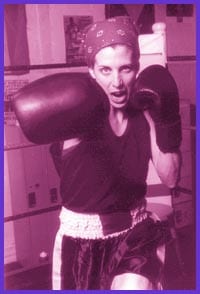Savoy Howe’s first play, Doohnamow, is a compact and enjoyable one hour.
A competitive boxer, herself, Howe plays the lead role of Millie, a young girl who comes of age through boxing. Millie is from a small conservative fishing town in northeastern New Brunswick.
She looks up to her older brother Mike, copying everything he does. In her family’s basement, Mike boxes with a punching bag and Millie decides she can as well. But Mike admonishes Millie, calling her a “lezzie.” When Millie asks her mother what lezzie means, the mother says that “lezzies are dirty people.”
Hurt, angry and confused, Millie decides to move to Toronto two months after her 19th birthday. Her uncle has told her that Toronto is a city where people are able to be more free and express themselves.
Millie learns from a boxing coach (played by Howe’s real-life coach Ray Marsh) that in boxing there are four important components: offence, defence, conditioning and heart – the one intangible that cannot be taught. “Anyone that steps into the ring has courage,” he says.
Millie is courageous, smart, a woman, lesbian, and a boxer. She claims her womanhood thorough boxing, coming to terms with the fact that being a boxer does not make her any less of a woman.
With direction by Moynan King, Howe shines with excellent stage presence and charisma. Her monologues are evocative and display good comedic timing.
Alternating with her soliloquies are wordless movement pieces choreographed by Eryn Dace Trudell, who plays Millie’s opponent. Trudell has presence, too; she does not speak but is very funny.
As a playwright, Howe is very precise in conveying her life and her family. But Doohnamow (womanhood, spelled backwards) left me hanging; there were lots of loose ends. I didn’t understand how, and if, Millie confronted her sexuality and whether Trudell as her boxing partner was also supposed to be her love interest.
The dance sequences seemed to dissipate the energy built up by the monologues, especially near the end. I wanted more words, more Howe. But I did love the silent ending, with the two women embracing. Perhaps this was Millie’s way of accepting herself.
Though disjointed, Doohnamow is a strong feminist vision of how women can learn to express anger and frustration.
Doonhamow closed April 22.

 Why you can trust Xtra
Why you can trust Xtra


